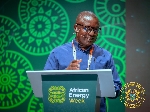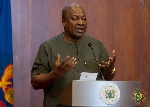CenPOA 'respectfully disagrees' with gov't over No Fees Stress for tertiary institutions
 CenPOA Executive Director Michael Donyina Mensah
CenPOA Executive Director Michael Donyina Mensah
The Center for Public Opinion and Awareness (CenPOA) has reacted to recent media reports indicating that Education Minister Haruna Iddrisu had proposed the allocation of 2.5% of Ghana’s oil revenue to fund the governing National Democratic Congress’s (NDC) No Fees Stress policy for tertiary education, indicating it "respectfully disagrees with this proposal and considers it a misplaced priority at this stage of Ghana’s development".
"While education remains a cornerstone of national progress, it is the view of CenPOA that the government’s obligation to provide free education should reasonably extend only up to the Senior High School (SHS) level," a September 8, 2025, statement by CenPOA asserted.
"By this stage, citizens would have attained functional literacy and numeracy, positioning them to contribute meaningfully to society," the group explained.
CenPOA argued, "Tertiary education, on the other hand, should remain optional and primarily supported by individuals, with government providing targeted scholarships and interventions only where resources allow."
"Indeed, even in many advanced economies, tertiary education is not entirely free but is supported through mixed models of funding, grants, and private investment," the NGO bolstered.
CenPOA urged prioritising meeting basic needs in the educational sector.
"At present, Ghana continues to grapple with challenges such as schools operating under trees, infrastructural deficits at the basic level, and the sustainability of the Free SHS program itself," the NGO said.
"Diverting scarce oil revenues to fund tertiary education under the “No Fees Stress” initiative risks worsening these pressing concerns. CenPOA views this proposal more as a populist promise aimed at electoral gains than as a deliberate, pragmatic policy for long-term national development."
The statement signed by Michael Donyina Mensah emphasised, "Rather than channeling vital oil revenues into free tertiary education, CenPOA believes the government should prioritize investing in sustainable industries and job creation."
"With thousands of unemployed graduates already struggling to find work, expanding productive sectors of the economy will not only provide employment but also generate real demand for tertiary education in a manner that is sustainable and growth-driven," the statement stressed.
CenPOA concluded by urging "policymakers, stakeholders, and the general public to approach such proposals with caution, focusing instead on strengthening foundational education and creating an enabling environment for economic growth."
President John Mahama campaigning for power assured Ghana he would not cancel the Free Senior High School policy started by former President Nana Akufo-Addo. He rather introduced a new programme for first year tertiary students called No Fees Stress, waiving off their freshman fees.
Source: classfmonline.com
Trending News

Parliament to revoke LI permitting mining in environmentally sensitive areas, says Justice Minister Ayine
02:35
TVET to drive Ghana’s educational reforms – Deputy Education Minister
11:04
PNP calls for urgent suspension of MP for Twifo Atti-Morkwa over comments on KNUST headmaster saga
11:32
Africa must define its own energy transition –Jinapor
14:00
DSTV: Ghanaians wanted price cuts, not package upgrades-Bernard Monnah to Sam George
17:38
Cape Coast Mayor vows massive decongestion of market centres
12:04
YEA launches Ghana’s first-ever Community Medical First Responders Unit
14:08
Galamsey: President Mahama encourages CSOs to keep up criticism, advocacy
02:30
Deputy Education Minister urges Africa to reposition TVET as first-choice pathway
08:50
Naa Torshie to switch her support for Ken Agyapong to fulfil her Vice Presidential ambition
11:24



